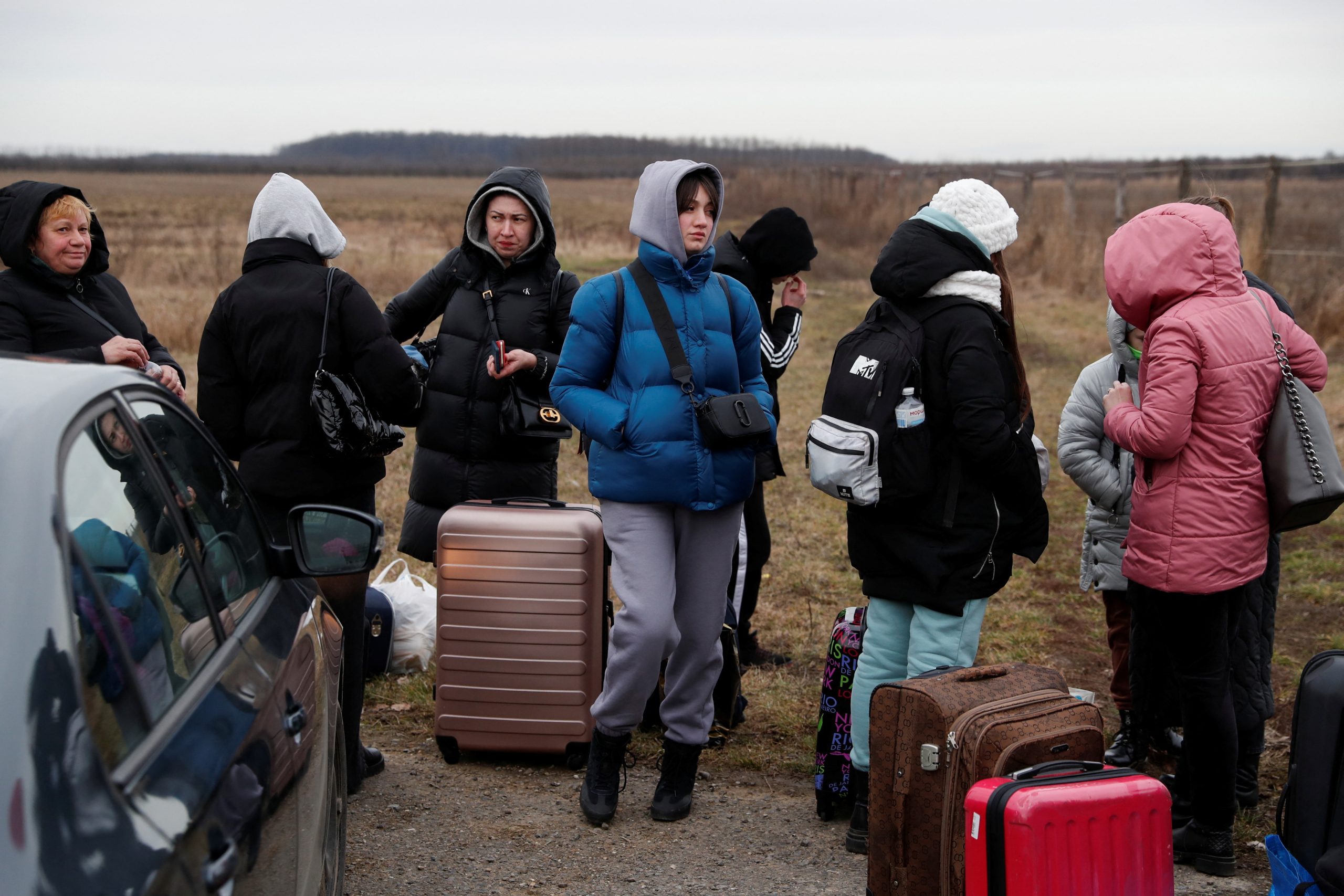
[elfsight_social_share_buttons id=”1″]
Refugees fleeing Russia’s invasion of Ukraine continued to pour across its western borders on Saturday, with around 100,000 reaching Poland in two days and some finding temporary sanctuary in sports halls and others in churches.
As Russian forces pounded Ukrainian cities including the capital Kyiv with artillery and cruise missiles, fearful families thronged European Union borders hoping to enter Poland, Slovakia, Romania and Hungary.
Ukrainians already safely in the European Union waited anxiously at the borders for relatives to join them; many had walked for miles to try to reach safety.
“The most important thing is that people survive,” said Katharina Asselborn, wiping away tears as she waited at the Polish border for her sister, aunt and her three children from their home in Odessa.
“I don’t know what will happen next. They lost their own house. It’s so terrible. The last 30 kilometers to the border they went on foot.”
At the Hungarian border town of Beregsurany, 69-year-old Ilona Varga crossed into the European Union on foot, leaving behind her home, shop and hopes she might soon return.
“My kids are telling me to move over to Hungary for good, and they are right,” Varga said. “But it is so hard to leave everything behind, I was born here, I grew up here, I have my work here, everything ties me here.”
At the same border post, 58-year-old Nataliya Ableyeva brought a stranger’s two children to safety after border guards prevented their fighting-age Ukrainian father from crossing.
“Their father simply handed over the two kids to me, and trusted me, giving me their passports to bring them over,” she said. On the Hungarian side, the two children were reunited with their mother.
In Poland, which has the region’s largest Ukrainian community of about 1 million people, a further 9,000 people had crossed the border since 7 a.m. on Saturday, Deputy Interior Minister Pawel Szefernaker told a news conference.
At Medyka in the south, some 85 km (50 miles) from Lviv in western Ukraine, thousands of Ukrainians waited for officials to process them as refugees. A group of women dragging suitcases with small children sitting on them shouted “Glory to Ukraine” as they passed.
The lines grew during the day at the crossing point. Refugees sifted through bags of clothes, blankets and toys and other supplies left by the side of the road. Locals left donations of food for anyone who needed it.
“I arrived today at 3 a.m. and I am waiting for my wife,” Taras, 25, told Reuters on the Polish side. “She called me from the Ukrainian side and there is a 30-kilometer queue of cars and people. She said she does not know when she will cross.”
‘THERE WAS SHELLING, AIRPLANES WERE FLYING OVER’
The Polish government has reserved 70,000 hospital beds for the war wounded and prepared a train to transport the injured from Ukraine. More train wagons been loaded with humanitarian supplies for the Lviv region.
“If necessary, the train will go to Mostyka (just across the border) to pick up the injured and then travel to Warsaw where the injured…will be transported to specialist hospitals,” Polish Interior Minister Andrzej Adamczyk said.
Czech railways sent special trains that arrived early on Saturday at the Polish border carrying Ukrainians living in the Czech Republic to meet family members who had escaped the war.
In the Slovak border town Ubla, officials put refugees in a local gymnasium where foldout beds and air mattresses filled a basketball court. Volunteers handed out sandwiches while young children giggled and played with donated stuffed animals.
The country’s interior ministry said over the past 24 hours, authorities processed 10,526 people at the Slovak-Ukraine border. Before the conflict, they averaged 1,444 people daily.
“We came to the border by taxi, and we are going to Prague to meet my husband, to safety,” Miroslava Krackovska said at the reception center.
In Romania, the Orthodox Church housed refugees at a 15th century monastery. In neighboring Bulgaria, two buses, carrying ethnic Bulgarians from Odessa arrived early on Saturday and a third one was on its way. Bulgaria has sent another four buses to Kyiv to evacuate people from its 250,000 minority in Ukraine.
“For two days we sat on our luggage, hiding in the bathrooms,” Tanya Mitova, an ethic Bulgarian, told national BNT channel just after she arrived in Durankulak, close to the border with Romania.
“There was shelling, airplanes were flying over, it was very scary.”
Copyright 2022 Thomson/Reuters
